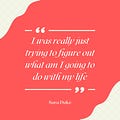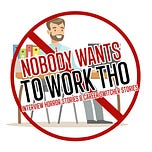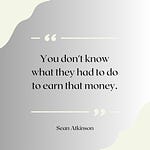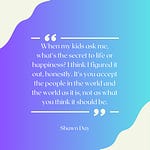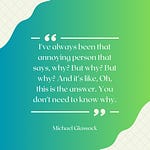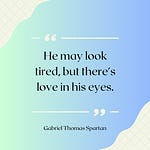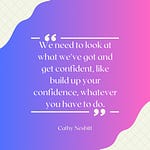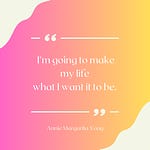About
Meet Sara Duke, a woman who became a researcher in economic development in India. Sara was passionate about creating social impact and wanted to empower low-income, first-generation women in India to become self-sufficient and economically empowered. Her research and advocacy led to policy changes that supported women's economic empowerment in India. Sara's work is a testament to the power of research and innovation in creating a more equitable and just society.
Nobody Wants To Work Tho Website - https://www.nobody.chat
Subscribe To The Newsletter - https://www.switchintotech.com
Listen On:
Apple Podcast - https://nobody.fyi/apple
Spotify - https://nobody.fyi/spotify
Google Podcast - https://nobody.fyi/google
Donate:
Stripe - https://nobody.fyi/donate
Cashapp - $mselyserobinson
Patreon - https://nobody.fyi/patreon
Be A Guest: https://nobody.fyi/guest
Affiliates:
Switch Into Tech - https://www.switchintotech.org
Nube: Switch Into A Cloud Career Book - https://nobody.fyi/book
Tech Freebies - https://nobody.fyi/freebies
Monthly Seminars - https://nobody.fyi/seminars
Full Tuition Scholarships - https://fullscholarships.org
Data.gal - https://www.data.gal
Alternate Titles For The Algorithm:
Breaking Barriers: The Journey of a Woman Economist in India
From Small Towns to Big Ideas: The Inspiring Story of an Economic Development Researcher
Changing the Game: How One Woman's Research is Making a Difference in India's Economy
Trailblazers: Women in Indian Economics
Empowering Women in India's Economy: Insights from a Researcher
Shaping India's Future: Conversations with an Economic Development Expert
Bridging the Gap: A Woman's Perspective on Economic Development in India
Innovation in Indian Economics: A Researcher's Perspective
Breaking Down Barriers: A Woman's Journey to Economic Empowerment in India
Women Leading Change: Insights from an Indian Economic Development Researcher
Challenges and Opportunities in India's Economic Development: A Woman's Perspective
Empowering Women Entrepreneurs: Lessons from an Indian Economist
Building a Stronger India: An Economic Researcher's Perspective
The Future of India's Economy: Insights from a Leading Researcher
Women in Indian Development: A Researcher's Journey
Driving Economic Growth: Lessons from an Indian Economic Development Expert
From Ideas to Impact: A Woman's Journey in Indian Economic Research
Transforming India's Economy: A Woman's Perspective
Leading Change in Indian Economic Development: Conversations with a Researcher
Show Notes
0:01
Hey y'all, this is your host Elyse Robinson. With nobody wants to work though podcasts, I hope the stories were inspire you to switch careers. I was an auditor in my past life and now I'm in tech, let's get to it.
0:19
We are switch into tech, tech resources to accelerate your career in information technology, monthly classes on tech topics. We offer free or discounted exam vouchers, scholarships for you to me courses, free events, free boot camps and more. You can find us at www dot switch into tech dot org.
0:45
Hey, Elyse Robinson with nobody wants to work though podcast and today we have Sarah Sarah, what was your first career? And what did you transition to?
0:56
Wow. So my first career I was a bank teller at a credit union. That was many, many moons ago, like might say years. And today, I am a user experience researcher in tech. And pretty much at a lead or principal level. So I had a lot of career transitions in my journey. And in my path. I, the first job I had, as I mentioned, I was 18 years old, at that time had no idea what I wanted to do or what I wanted to be, I just think I landed into that position because I was good at math in school. And just thought that this would be a field or a job that I could that I could do. I think I worked that job for a for a few years actually. And I've actually well, or with that company for a few years. And then I moved into their loan application processing department. And then I was actually recruited by the Federal Reserve Bank. And by one of their branches, and my hometown of Richmond, Virginia. And there I was working in a new department that was taking over back office operations for the US Treasury. It was really, very early stages of this was circa y2k. So it was very early stages of what we would call digital transformation today. But it was basically taking, taking the operations of looking at fraudulently cashed Social Security checks, tax refund checks, anything that was issued by the US Department of Treasury, and trying to image those checks, as you digitally image them, but also digitally match the signatures to what was on record. And this is how a lot of fraud in the early days was was being captured, was saying, Oh, this signature doesn't match. And there was some really interesting cases to see both the fraud, as well as the counterfeits This was also capturing counterfeit things. So I worked at the Federal Reserve for five years on this on this team was a small but mighty team because we handled over a $50 million of US Treasury check processing, and actually caught a lot of the fraud and counterfeit in the process. But that counterfeit was really I mean, the fraud part was also mind blowing, because there are some places in the world like in the Philippines, where we had World War Two veterans that were receiving checks for their service, and a thumbprint or fingerprint was being used to sign and that was acceptable. And but then, you know, in some of those cases, it was like this person is like over 100 years old now how can they still be alive to still be receiving this? So in those cases, the Secret Service actually got involved. And in one place, they tracked down a beneficiary or recipient who had actually passed away many years prior, but his wife had actually, you know, severed his thumb put it in a jar of formaldehyde and had been using his thumb for many years to cash those checks. They were talking like 15 years, because when the Secret Service went to that village, and they asked around, where can we find this person's house? Many people didn't know who they were talking about. And a few people who did it were like, oh, man, this guy's been dead for many, many years. So it was it was quite fascinating.
5:29
I want to I want to interrupt because I don't want you to get in trouble. You can you could tell the story, right? Because I know how the government is.
5:36
Yes, I can, I can tell. It was it was it was actually told to me by the Secret Service. So. So I'm sure it's it's fine share. But it's, it was interesting. So I think the reason I tell this story was, this is really where my interest in human behavior probably started to take hold. From from there, I, you know, I would at the time, I was putting putting myself through my bachelor's degree, and do working full time during the day and going to business school at night, getting a bachelor's in economics. But I decided that I didn't want to pursue a graduate degree in economic theory. And because I wanted to see economics in action, so I focused on. I focused on urban and regional planning with a sub focus on economic development. But as I was doing my graduate degree in urban and regional planning, I realized halfway through this 48 Credit program, that there was no way in hell, I was going to ever go work in local government, and sit through zoning planning committee meetings and things of that nature. I was just like, This is not my tribe. This is not like what I'm going to do. But I had a love for research. So I supplemented that, that coursework in that program with a post grad and Applied Social Research where I studied quantitative and qualitative research methods. And instead of doing a capstone project on like neighborhood redevelopment, or some sort of planning project, I wanted to do a master's thesis. And my master's thesis is what took me abroad. Because I was really focused on how to how economic development activities and initiatives and projects were being utilized to help empower low income and disadvantaged women women's empowerment, was something that was very strong, that I strongly held, I was an activist in college. And so this was this was one of the one of the the areas that I worked on in my activism. And so I chose to do a thesis on looking at how the SP, a small business administration, SBA, utilizes women's business centers. And it's programming of microfinance to help low income first generation women, women from a variety of backgrounds to become self sufficient and become economically empowered. And I compared it to I did a comparative study with India, which was the world's largest market for microfinance at the time of my research and my study, and it had all all shades of microfinance from very from commercialized microfinance that had its own microfinance institutions and regulated banking to grassroots activities that were basically you know, villagers coming together or putting their money in a pot on a monthly basis and kind of rotating it amongst their different households and community members for use on a monthly basis. So I, I was just, I would say, there's one word that describes me and that's explore. I'm always looking to explore and find out what are the common things that bring us together in the world? What are the similarities? And I've thought, Okay, this is really interesting, because we're doing similar initiatives, but we're in an autonomous society here in the US. And, but then in the collective society, it's also very large, you know, very large economy, very large country in India, and also quite diverse in its population. They're also instituting microfinance but in different ways. So I didn't want to look at the actual financial mechanisms and study that, because I had already been more well established, I was looking more at the people behavior, more the motivations that I use the strategies. And the practices have those changemakers in the middle who helped facilitate and administer these various programs. So I looked at a Rural Women's Federation in northern India, that was kind of supporting and facilitating more of a grassroots kind of microfinance way of getting money into the hands of, of, of the rural women there. And and then I was looking at a women's business center in Northern Virginia, Metropolitan Northern Virginia. And what I found in my research was that networking on both sides was their central practice. And it was all about how do we get women connected. And, and that practices and the values and the strategies, despite being two completely different worlds, if you look on it externally, a were very much the same. And it was it was very interesting. So from there, it kind of kicked started my career in research. It I graduated at the time of the economic collapse in 2008. So the I didn't come from a background of international development, in terms of I didn't graduate from a prestigious university, like John Hopkins School of International Affairs and studies. I didn't have that kind of background, but I knew that I wanted to go into international development. And I knew that research was really where I wanted to hone my expertise, or really where I wanted to build my career. So I ended up going back to India, in working with the nonprofit or the NGO that I had studied for my master's thesis. And, and that's really where I got a foothold because I just said, you know, what I'm just to put myself into the in the locality and into the environment of where I want to be and just go and do it and make it happen. And it was, it was great that the NGO or what we call here in the US nonprofit.
13:04
So,
13:05
okay, sorry about that. You could have kept talking, I was just like, oh, keep talking, keep talking.
13:09
Oh, sorry. Sorry. Yeah. So it was it was it was great that I was able, I had that opportunity to go back and work with this NGO, what we call nonprofits here in the US to continue to support some of the initiatives and programming work that they had, that I had, you know, help support them or got engaged with when I was doing my master's thesis research. And then I from there, I needed to it was a great opportunity to just get in get back into the country. But I knew that I wanted to move on to bigger opportunities. So then I found myself working with a consulting firm that is India Indian based in the domain of microfinance. But once I got into the consulting firm, and I got into the commercial side of microfinance, I realized that there there was actually a lot of corruption in that field. It was not at the grassroots level, but it was more at as you got into the higher, more commercialized side of things. And it just didn't sit well with my values, like charging 30% interest rates on a monthly basis was it was pretty, it was pretty tough to swallow. There was very little in the way of education for the consumers of these microfinance loans. And it was in so I decided, I'm not going to focus on microfinance, but I still have these amazing skills on research and I still want to do a Still want to put my efforts into something that's going to bring about change in the world. So from there, I did pivot into the international development sector. And I was able to work I got contract I was living in New Delhi at the time, and I got a contract with the United Nations to develop a, an evaluation tool for measuring women's empowerment in changes of women's empowerment through their programming. So United Nations had a lot of programs focused on enhancing women's empowerment. But the the term and the definition of women's empowerment was pretty ambiguous, depending upon who you spoke with the agency, the background that they had, and the program that they're working on this definition, the definition of it really vary. And for me, it was like, Well, how about we talk about the people who you are trying to empower? Like, what did how did they, you know, what did they define empowerment as what's most important to them, and let's measure empowerment based on their definition. And so that's a that's what I did is I went out and I did research, among domestic workers, I did research with unionized iron, or brass workers and Murata bad, I did research with porters, people who carry your belongings in the, the tourist town of Shimla, in the Punjab, so it, it was quite interesting research, what I really loved about it was looking at giving power back to the people and not saying, you know, we're an agency. And here's, here's how we are going to define your experience or how we think you should be defining your life as in terms of these development goals. And so I developed this, I developed this evaluative tool for them, it helps to actually quantify what empowerment is and quantify it based on the definition of what was most important to, to low income women, which was, for them, it was eye opening, because I also measured it against what their partners and what men under their lives considered as women's empowerment. For women, empowerment really came back to social standing and social prestige, a little bit had to do with material things such as having their own house, but that's those, the community aspect of it of empowerment was really important to them. On the other side, though, men thought that as long as my partner has a home, as long as I'm providing her with a home, then she's empowered. But this is not how women defined empowerment. And so that was really, really interesting. But it was it was a consulting project. And I wrapped it up. And that tool went on to be implemented in us by the United Nations in Bangladesh and other countries. And I moved on to Pakistan. So I went to moved from New Delhi to Islamabad. And there, I continued to do some consulting and work with think tanks and NGOs. And in Islamabad, and then I then from there, I met my partner. And we, he got an opportunity to work with the Bill and Melinda Gates Foundation and the who, in northern Nigeria, on some public health initiatives. And I moved there and I also provided some support and research on on it, you know, helping rural communities adopt vaccines and vaccinations, what what was, what were effective social and social mobilization methods and so forth. In 2015, I decided that, that part of my life of living abroad in moving about which had been a bit over seven years, that it was time for me to come back to United States. It was quite an experience to live abroad and work in these various countries. I also had, in the meantime, done some assignments in Jordan in terms of monitoring and evaluation of international development programs in Jordan and in the West Bank. But I became a mom and I decided that I needed to provide a little bit more stability In terms of the, you know, where I was going to raise a child, in terms of ensuring that we had access to electricity and water at all times, and things of that nature, and so decided to come back to the states and settle back into Northern Virginia. And I was working in another nonprofit, outside of DC in the international development sector. And I just realized that the policies of that take place and that are crafted and drafted in the windows of Washington didn't match with the ground truth or ground reality of the places that I have worked in, and the communities that I had served and been a part of, and had lived among, and I just realized that this is, this is a field, this is no longer for me. You know, what I'm seeing in the DC and the discussions and, you know, the policy
21:07
negotiations, just absolutely does not match the needs, and the reality of so many people's lived experiences that these are supposed to positively impact. And I and I looked across, I really at that point in time, it was like 2016. And I had, I would say, a very, I had a career breakdown, like I would just went through months of anguish and frustration and discontent and, and discouragement. And I was really just trying to figure out what am I going to do with my life. Like, if there's like, the, you know, there's movies of the midlife crisis of the woman on the floor crying, just like completely, like having a breakdown. That was my that was, that was me in the summer of 2016. Just spinning my wheels and figuring out what I was going to do. But what happened, I did have a breakthrough in the inspiration came from looking at photos of Syrian refugees, because I had done some work with Syrian refugees in terms of monitoring and evaluating some of the some of the aid and services that they were receiving in Lebanon, and ensuring that that emergency aid and relief was being properly distributed. But looking at photos, and realizing that all of them had cell phones, every single Syrian refugee had a cell phone, and I realized that this is where change in the world is coming from. That it wasn't coming through governments, it wasn't coming through policymakers, people were empowering themselves and becoming empowered through a smartphone. And that they literally only had to have that smartphone to escape the escape what they were experiencing the the tragic, and injustice and the tragic, you know, war that they were that was being excised on them by their own government in Syria, they literally could just open their phone have access to underground routes being shared by other refugees that that showcase on a map, different border check posts showcase in the map, where they could get water, they had WhatsApp to stay in communication with their friends and family. They could you know, access to their scriptures to their, you know, for for spiritual inspiration and support. They had access to their local governments in Germany, that were providing their own apps in terms of showcasing both in Arabic and the German language, the services if you immigrate here, here's how we can get you the support and so forth that you need. I was just, I was blown away by this revelation. I was just surprised. I was just like, this is the technology is the way the future of you want to support change in the world. It's going to be through technology and technologies, what's empowering people and their lives. And so I said, this is where I'm gonna shift my career. Um, I took a very hard route to transition and pivoted to tech. I actually took a course on UX design in the first part of the course. It was through one of these boot camps and the first part of the course was focusing on what's the problem that needs to be solved. What's the problem that you experience in our relating to you work that needs to be solved and go out and research it. Well, I got the research part, Gao, like I, I'm a UX, I mean, I was I had those research skills honed. But I became impassioned with the problem that I focused on, which was finding and securing and maintaining reliable childcare, because at the time, I was a single parent, and, um, and I wanted to, it was difficult to find and get maintain reliable, personalized childcare. And so I decided that I just kind of became enthralled in that solving that problem, and then actually ended up bootstrapping and starting up my own startup, I established a platform to connect parents and expecting parents to fully vet it nannies that included, what made it different from other platforms in the market was that it was full service like you, you could see fully vetted candidates, you could see their background and criminal record history checks driving record, were available, wasn't something that was put on the parents who were trying to take advantage of that service, for them to go and pay for an extra service, this was all included. And it was all part of the vetting process of candidates prior to them even getting showcased or profiled on the platform. It also featured, you know, an opportunity for the nanny candidates to negotiate their their offers directly on the platform. And in addition to that, it brought transparency in the form of a suggested market salary range. So as we see coming about now, uh, with companies, by state laws posting, suggesting that, you know, you know, whether it's New York, California, Washington all saying that you needed to post the salary range. I've been doing this in 2016, with my own platform of saying, based on the, you know, location, you know, so many different factors that we that I had discovered in my research with parents and with personalized child care providers. What those factors were, what was the average rate and range based on those factors, I could work with data scientists to create this algorithm, the suggested market salary range algorithm on the platform, to really fully bring about pay transparency, and really also to empower, you know, those offering your services on the platform to negotiate. And so I did this, built this platform, with a small team between 2016 and 2018. But realize that I, I realized that this, this wasn't a business that I want to stay in long term. I think it was great experience for me to get the Tech experience dealing. It was it's when you are a tech startup founder, it's a roller coaster, really, really is. And it's one day you're putting out fire because the firewall has been, you know, hacked. And you have to, like, get up to speed with what does that mean? What are the solutions? And what are your opposite options for that? And who do you work with as opposed whether it's AWS or some some other service? What's what's, what's the pros and cons there to, you know, marketing and everything. So, it was quite an experience. And then, you know, from there, I, you know, went to work with an intelligent startup, or a startup in the intelligence space in Washington, DC, which was really interesting to go from your users being a childcare providers to those being intelligence agents, or analysts, for for the US government, in other government, other allied governments around the world. But it was really interesting, because it was just like, you know, these are trusted assets, like what how do we how do we help with that? There, wasn't it in terms of the emotions and what people valued and how much they put into it. It's the same as how much you put into taking care of your child, right? You want the best. And so how do you establish that trust? How do you maintain that trust? How do you ensure get people the best information To make the best decisions in their in their work. And so those are the interesting that I was able to make those the connections between different worlds and make that transition. So worked with this work with this startup for a little bit of time. And then the pandemic hit. And
30:22
it, you know, there was an adverse experience, and I had to, you know, transition. And at that company, I was a product manager, which was kind of similar to being a startup founder, meaning that product managers are fully responsible for the whole, you know, ensuring that the experience is something that's defined, and that gets developed. And then it gets launched, I realized in reflection that I, in this period of the early days of the pandemic, that I just didn't want to be doing the be the person wearing 100 hats at one time. And I want it to go back to my roots of what I really, really loved, and what I really enjoyed and focus on a strength. And so my strengths have always been research. And so this is where I again, made another career pivot. And this time it was into user experience research. And so I pivoted into UX research. And since that pivot I have worked with, as a UX researcher for Facebook now called meta have their own internal incubator. And I worked on a number of, of mobile app experiences that were, that were being incubated. And then most recently, I've worked with Microsoft. Again, this was also in new product development, where I, you know, worked across a portfolio of experiences. And this one was really interesting, because this one brought me kind of full circle back to my degree in urban regional planning, because it was focused on the digital overlay of physical experiences. So think of, it's always called Smart campus, and you can think of like smart cities, smart campus, these are all experiences where you incorporating a digital overlay, whether it's a car navigation, or kiosk, to you know, in a in a physical, it might be hybrid meeting rooms in a corporate environment. So all of this, you know, came full circle with that. And so I lead the UX research roadmapping, and research activities across the portfolio of those experiences. And so, that's been my career journey. It's been interesting. I've had a lot of transitions and pivots. But I think the thread when I discuss it with people is is that of all the thread is explore exploration, and trying to find the connection between people. And I think this is what technology is, technology just serves as the medium that people have always been there, they will always be there. But it's how do we harness that technology, to bring those connections, help them, bring them to fruition? And and help them help each other meet our goals and our needs and our aspirations?
33:47
So yeah, gotcha. I mean, you pretty much answered all my questions. Um, last question would be, what are some tips and tricks or, you know, type of guidance that you can give someone that wants to, you know, go into, I can't talk anymore. Go into changing their career.
34:14
Oh, wow. Um, I think the first tip and trick as as you've probably heard from other people, is you know, talk to people who are already in the career you know, figure out whether it's for you first and foremost understand what are the challenges understand what what they love about it, what they like about it, understand what's what's the skill set that they use the most in the career I don't think there's a perfect career for any there's there's no such thing as perfect careers, perfect jobs. So be sure to get like what is the ugly side of it? Like there's there's a lot of Like, there's a lot of careers that are glamorized, whether it's entrepreneurship, even in the field of UX. But then when you get into it, you know, we have a lot of, you know, common challenges that we face. You know, I can produce research, and I can have product managers and other stakeholders that will wholeheartedly ignore it. And so you will face though you will face had those experiences in your career. So, are you ready to accept that and have and have to deal with that? You know, in the career of UX research, for example, we aren't a new field, but we aren't as well established as, say product management. So sometimes and a lot of companies, UX researchers are not reporting to another UX research professional, they are reporting to a designer or design manager who may have never done or worked in research. Are you ready for that? Will you be able to advocate in, evangelize or socialize what UX research is in that experience? So there's trade offs for everything. And so I think, one in terms of doing that career transition is to really widely meet as many people as you can to get, you know, the pros, the cons, the good, the bad, the ugly, the challenges and the joys of it. So that's the first tip that I was just another tip. In my field, it's best to get experienced by doing some projects. And, you know, that is also going to let you know whether this is really a career for you or not. We do have a Slack channel called UX rescue, where it matches aspiring and, you know, junior or early UX designers and researchers, to nonprofits and other organizations that typically do not have the budget for this type of expertise. And you'll get a project whether it's a website redevelopment or working on an app or or, and coming up with designs for it and so forth. So get that experience. And and you need to start building your portfolio in that way. So those are a couple of tips specifically in my field that I would suggest
37:43
that gotcha, you heard it from Sarah. Where can we find you Sarah?
37:49
You can find me on LinkedIn. Sarah, Duke SAR, a D, U K, E. So linkedin.com backslash in backslash Sarah Duke.
38:02
And where can we find the UX rescue group?
38:05
It's a Slack group. So Oh, Slack group, okay.
38:08
Do you have a link or because I can post that in the in on the video?
38:18
Oh, let me see if my kid you.
38:22
Other than that. Thank you so much, Sarah, for coming on to the channel. Nobody wants to work though. Podcast and thank you for listening and subscribing if you haven't already, and we'll see you next time.
38:40
All right, fabulous. Thanks, Elyse. Thanks for having me on today. Take care.

